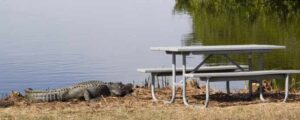Now that summer is in full swing, many families are flocking to various types of bodies of water in order to picnic, camp out, fish, cook out, swim, and engage in a multitude of water-related sports and activities.
As with any outdoor activity, there are many risks associated with being in close proximity to ponds, rivers, and lakes. Of course, there is the natural risk of drowning; however, there is also the risk of being in close proximity to the wildlife that resides in and around those bodies of water.
In this guide, you will be introduced to a few measures that will optimize your safety while enjoying the great outdoors.
The following represents general safety tips that should be adhered to when visiting bodies of water – regardless of whether or not swimming will occur:
When visiting natural water sources, you should engage in the following in order to remain as safe as possible:
Before visiting a natural body of water – for any reason – it is imperative that you learn all about the natural wildlife that may live in or near that water source.
In the State of North Carolina, you may come in contact or close proximity with a variety of snakes, alligators, raccoons, beavers, bear, deer, feral hogs or pigs, coyotes, skunks, birds, moles, opossums, and other creatures that are similar in nature.
You should avoid feeding and approaching the animals – especially alligators and snakes. These can become aggressive. Remember, you are in their territory, not yours. They have the advantage in the wild.
If you find that you are near a body of water with a nuisance alligator, it is important to seek out alligator removal services and steer clear of the animal. For more information, contact us today at: 855-465-1088